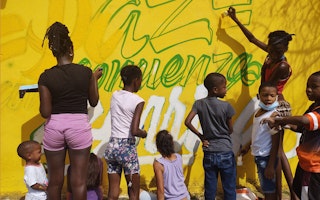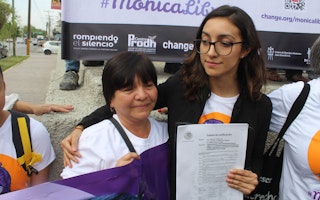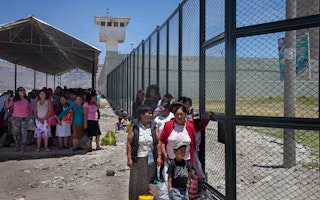NEW YORK—The Open Society Justice Initiative is urging the international community to make clear its support for the UN-backed commission fighting corruption and organized crime in Guatemala, as it faces growing political pressure in the run up to presidential elections on September 6.
Manuel Baldizón, the presidential candidate of the opposition Líder party, has called for the removal of the director of the International Commission against Impunity in Guatemala (CICIG), Ivan Velásquez. Baldizón has claimed that the commission is being manipulated by his political rivals to undermine his bid for the presidency.
Baldizón’s candidate for vice-president in September’s elections, Edgar Barquín, is among almost a dozen members of the Guatemalan Congress who are at risk of losing immunity before possible charges as a result of a series of corruption investigations by the attorney general’s office, carried out with CICIG’s support. Seven other Líder members of Congress are also facing impeachment proceedings.
Since April a series of CICIG-backed investigations have exposed corrupt dealings at the national police, the customs service, the social security agency, in Congress and in the top ranks of the judiciary.
James A. Goldston, executive director of the Justice Initiative, said that CICIG’s investigative work is in line with its mandate.
“By all indications, CICIG and the attorney general’s office have based their actions on available evidence, and investigated individuals without regard to political party or official function. To expose and dismantle corrupt structures is the primary reason Guatemala and the United Nations created CICIG in the first place. CICIG is doing its job, and doing it well.”
The CICIG-backed investigations have has also led to significant resignations within the ruling Patriotic Party administration of President Otto Pérez Molina. President Pérez Molina himself is facing an impeachment bid in Congress, while his vice president Roxana Baldetti was forced to step down in May. Others arrested include the administration’s former minister for mines and energy, the head of the social security administration, and President Pérez Molina’s son-in-law.
Anger over the revelations led to a series of massive demonstrations in Guatemala City, with thousands of protesters demanding an end to corruption and the resignation of President Pérez Molina.
In June, CICIG released a report on the financing of Guatemala's political parties which concluded that they derived around half of their financing through corruption, including 25 percent from wealthy elites and businesses and 25 percent from criminal organizations.
CICIG was established in 2007 to support Guatemala’s attorney general in the investigation and prosecution of criminal networks linking government, the judiciary and organized crime that had developed during the country’s long civil war.
A Justice Initiative briefing paper in March 2015, Unfinished Business: Guatemala’s International Commission against Impunity, highlighted CICIG’s successes as a mechanism of international support for the rule of law. The report noted that CICIG strengthened state investigative and prosecutorial capacities; exposed large-scale corruption and prosecuted powerful individuals; facilitated legal reforms vital to sustaining the rule of law; and strengthened and safeguarded Guatemala’s democratic institutions.
Read more
Homicide Reduction
Q&A: How One Colombian City Is Tackling Violent Crime

Palmira, Colombia, is one of the most violent cities in the world. But a prevention program focusing on youth has reduced crime significantly—and earned it an international peace prize. The city’s mayor on what’s working.
WOMEN'S RIGHTS
Challenging Mexico’s Abusive Preventative Detention System

Mónica Esparza’s case is one of the most notorious cases of extreme gender violence carried out by Mexican authorities. What her story teaches about how to combat the country’s scourge of gender-based violence.
Keep Families Together
We Must Not Forget the Children of the Incarcerated

As a new report shows, draconian anti-drug policies in Latin America don’t just harm people who use or sell substances; they harm the children and families of the incarcerated, too. Thankfully, there’s a better way.